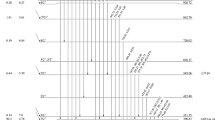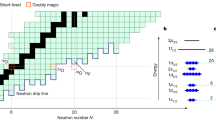Abstract
As has been reported by one of us1, uranium fission products can be collected by the recoil method many hours after the end of the irradiation of uranium by slow neutrons. This phenomenon can be explained in the simplest way by the assumption that one or more of the fission products are radioactive gases, of more or less long life and coming somewhere in the middle of the β-transmutation chain. To test this assumption we have performed the following experiments.
This is a preview of subscription content, access via your institution
Access options
Subscribe to this journal
Receive 51 print issues and online access
$199.00 per year
only $3.90 per issue
Buy this article
- Purchase on Springer Link
- Instant access to full article PDF
Prices may be subject to local taxes which are calculated during checkout
Similar content being viewed by others
References
Wolkov, N. F., C.R. Acad. Sci. URSS. (in the press).
Hahn, O., und Strassmann, F., Naturwiss., 27, 89, (1939); Aten, jun., A. H., Bakker, C., und Meyn, F. A., NATURE, 143, 5,I6 (1939).
Author information
Authors and Affiliations
Rights and permissions
About this article
Cite this article
CHLOPIN, W., PASSWIK-CHLOPIN, M. & WOLKOV, N. A Particular Mode of Fission of the Uranium Nucleus. Nature 144, 595–596 (1939). https://doi.org/10.1038/144595b0
Issue Date:
DOI: https://doi.org/10.1038/144595b0
This article is cited by
-
Eine bei der Uranspaltung auftretende Kernisomerie bei Xenon
Die Naturwissenschaften (1940)
Comments
By submitting a comment you agree to abide by our Terms and Community Guidelines. If you find something abusive or that does not comply with our terms or guidelines please flag it as inappropriate.



